
In law school they teach you to argue both sides — allowing you to better understand the issue presented and the strengths and weaknesses of your own argument. Earlier this week I put forward my best legal argument for why United must honor the mistake fares it sells consumers. Today, I will take the opposite approach, setting forward the most cogent arguments United can make for why it was under no obligation to honor the Danish Kroner $50 first class fares.
We will go through the DOT ruling again (.pdf here), this time with how I would expect United to address each part of DOT’s analysis–
The U.S. Department of Transportation’s Office of Aviation Enforcement and Proceedings (Enforcement Office) has completed its review of the mistaken fares that appeared on United Airlines’ (United) Denmark website on February 11, 2015. During the past two weeks, thousands of consumers who purchased tickets from United’s Denmark website at the mistaken fare levels have contacted the Enforcement Office asking that United be required to honor those fares based on the Department’s rule against post-purchase price increases of scheduled air transportation.
While 49 U.S.C. 41712 §399.88(a) is an important tool used to keep airlines accountable, it was never designed to force airlines to honor clearly erroneous fares, here outlandishly cheap fares made only available to buyers outside of Denmark by a deliberate and tortious tweaking of united.com. There can be no argument that a $50 fare from Europe to the United States in first class was several magnitudes below any comparable sale fare ever offered and clearly some form of currency error since it was only available when choosing Denmark as country of billing. This was an unambiguous mistake.
After a careful review of the matter, including the thousands of submissions from consumers and information from United, the Enforcement Office has decided that it will not take action against United for not honoring the tickets.
United cannot ethically be bullied by the ravenous wolves of the travel blogosphere into honoring a fare that was too good to be true and the DOT’s action reflects a sage determination that §399.88(a) does not protect unethical consumer exploitation of an airline. United acted swiftly to cancel mistake fares, eliminating any detrimental reliance argument.
The mistaken fares appeared on a website that was not marketed to consumers in the United States.
In order to purchase a ticket, individuals had to go to United’s Denmark website which had fares listed in Danish Krone throughout the purchasing process.
This is the crux of the issue — not only was this fare far too low be considered even plausible, but this fare was not even bookable through normal booking channels for U.S. consumers: the only way to book it was to manipulate united.com.
In addition, only people who identified “Denmark” as their location/country where billing statements are received when entering billing information at the completion of the purchase process were able to complete their purchase at the mistaken fare levels.
The DOT faced two choices. It could force United to honor the fares, thereby encouraging a practice of deliberate defrauding of an airline whenever an unmistakable technical glitch appeared or it could reign in this Wild West practice and apply a more common-sense understanding to the prohibition against post-purchase price increases.
Here, United never tried to increase the price — it just sought to void a transaction it never actually ascented to in the first place. The bad-faith practice of the overwhelming majority of consumers in falsifying their billing address in order to gain preferential pricing clearly contravenes our Contract of Carriage, even if the special fare was available to residents of Denmark.
Out COC states — UA has the right to cancel reservations (whether or not confirmed) due to the Passenger’s failure to comply with the rules set forth herein, including but not limited to, the Passenger’s failure to pay for the applicable Ticket under the conditions applicable to the fare for such travel.
Further, UA reserves the right to cancel bookings and/or reservations which it deems abusive, illogical, fictitious, or which are booked and/or reserved with no intention of flying without notice to the passenger.
Both conditions are met here. A false billing address (evidenced by an inaccurate recording of country) opens up United Airlines to chargebacks and other billing disputes, contravening ticketing rules and acting in this bad faith. This is deemed abusive practice, which is also grants United the right to deny transportation and refund payment. This is not a price-increase, but merely a refusal to transport.
Consistent with the Office’s treatment of fare advertisements and disclosure of baggage fees, it does not intend to enforce the rule in question (the post-purchase price increase prohibition) when the fare offer is not marketed to consumers in the United States.
The DOT wisely limits is own jurisdiction, noting that its regulatory scope is agency driven and not intended to cover EU nations such as Denmark, which may have their own protections in place for disaffected citizens but not rapscallion consumers from the United States.
Additionally, the Office is concerned that to obtain the fare, some purchasers had to manipulate the search process on the website in order to force the conversion error to Danish Krone by misrepresenting their billing address country as Denmark when, in fact, Denmark was not their billing address country. This evidence of bad faith by the large majority of purchasers contributed to the Enforcement Office’s decision.
Reward bad faith practices on either side would contravene public interests and the DOT was right to say that consumers who tried to defraud United by entering inaccurate billing addresses cannot be rewarded.
To ensure that the Office’s determination that United is not required to honor the mistaken fare is available to all affected consumers expeditiously, the Office is placing this notice on its website rather than responding separately to each individual who has contacted the Department.
The Office has also agreed that United may choose to post information about its handling of this incident in a prominent location on its website instead of providing individual responses to consumers who submitted an inquiry to United or the Department regarding this matter. We believe that posting of information by the Department and United is the best course of action as it offers the most effective means of reaching as many consumers as possible at the same time.
A quick post on united.com and on the DOT’s website is the most convenient and visible way to alert all those implicated by this fare of United’s response. Sending out individual letters is a burdensome effort that does not is not justified under the devious circumstances of the booking.
So what do you think? Do you think that the DOT made the right choice or that United should still honor the DKK fares?




Wow. We’re still talking about this? Everybody needs to move on. What happened is hardly surprising.
I approach this from a businessman’s perspective – mistakes need to be honored in order to keep companies accountable. If I fat fingered a client invoice and charged them $3,000 instead of $30,000 for a tax return, I don’t get to say “oops” and send them another bill for the difference. I get to eat it and then kick myself for a year for costing myself the equivalent of a new car for my lack of attention to detail. Why should the airlines be any different, especially when we as customers ARE held accountable for boo-boos through the imposition of penalties and change fees? As you said in your first post, if the mistake is due to a contractor’s error, the airline should have a cause of action against that contractor to recoup any damages.
As Denmark are in the EEA, I’m much more curious whether European regulations might force their hand more than American ones… As was pointed out above, these flights were sold in Denmark, so surely regulations that apply in Denmark should apply here? Just a thought…
I am actually a lawyer and the COC doesn’t add up: “UA has the right to cancel reservations (whether or not confirmed) due to the Passenger’s failure to comply with the rules set forth herein, including but not limited to, the Passenger’s failure to pay for the applicable Ticket under the conditions applicable to the fare for such travel.”
United would have to disclose these at time of booking. Under the plain language of this clause, the passengers did not violate any rules or conditions applicable to the fare simply by booking it at the price United was charging at the time.
None of this means that the this was illegal under DOT regulations, but I view with deep suspicion that United had the contractual right to rescind the fare. I do think that the common law doctrines of unilateral mistake and fraudulent inducement might apply here, but that voids the entire agreement–it doesn’t let United enforce a single provision of the contract.
Disclaimer: This is not legal advice. If you need legal advice, consult a lawyer. This doesn’t create an attorney-client relationship. Use common sense.
This clause is particularly troublesome: “UA reserves the right to cancel bookings and/or reservations which it deems abusive, illogical, fictitious, or which are booked and/or reserved with no intention of flying without notice to the passenger.”
Basically, this is illusory. It says United can cancel the contract in its sole determination based on some pretty nebulous criteria. I would think United would have an extremely difficult time convincing a court that this provision is enforceable.
“If I fat fingered a client invoice and charged them $3,000 instead of $30,000 for a tax return, I don’t get to say “oops” and send them another bill for the difference.”
I ordered a computer hard drive online and got two for one. It turns out that the seller had accidentally shipped me two drives. I was REALLY happy. Then they called me and asked for the other drive back and offered to send me an RMA label. I was curious to see if I could say finders keepers and googled precedent but it turns out that there was a legal case to be made that I had to send the drive back. Which I did.
Similar thing with banks and the IRS. If they send you a check for a zillion dollars and you cash it, not only do you not get to keep the money but they could even come after you for fraud.
So back to the mistaken invoice. In a clear cut case of an invoice where an employee perhaps mistakenly doesn’t send a customer the bill for all services rendered, it’s possible they could simply send out a second invoice to correct the discrepency. I get them from my doctor all the time. It turns out that insurance didn’t fully cover what they did, etc. Or the opposite: I have actually gotten credits.
But in this particular case, where an airline was defrauded by customers who misrepresented their home address, it’s similar to someone calling up an employee at accounts receivable and then convincing them that they were due a credit and getting a smaller invoice as a result. When fraud is involved, the matter is quite simple: The transaction is null and void.